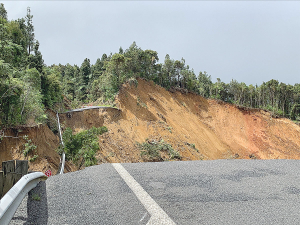Green no more?
OPINION: Your old mate has long dismissed the Greens as wooden bicycle enthusiasts with their heads in the clouds, but it looks like the ‘new Greens’ may actually be hard-nosed pragmatists when it comes to following voters.
 ICNZ chief executive Kris Faafoi says climate adaptation measures can reduce the risks created by storms like Cyclone Gabrielle.
ICNZ chief executive Kris Faafoi says climate adaptation measures can reduce the risks created by storms like Cyclone Gabrielle.
The Insurance Council of New Zealand (ICNZ) is urging the Government to take a leadership role on climate adaptation and build New Zealand’s resilience against the impacts of climate change on lives and property.
The ICNZ presented its submission on the Inquiry into Climate Adaptation to the Finance and Expenditure Select Committee yesterday.
ICNZ chief executive Kris Faafoi says the urgency of the climate crisis cannot be overstated.
“New Zealand’s vulnerability to climate-related hazards, including rising sea levels, coastal erosion, and extreme weather events, requires a clear and coordinated approach which the Government is best placed to lead on,” Faafoi says.
He says the ICNZ supports the development of a national climate adaptation model to guide policy and legislative frameworks and provide long-term clarity and certainty around the country’s response to climate change.
“This strategy aims to bring together central government, councils, the private sector and communities to effectively mitigate risks and ensure sustainable adaptation measures,” Faafoi says.
“We have seen firsthand the impacts of the Auckland Anniversary Weekend and Cyclone Gabrielle events on lives, property, and the economy,” he explains. “By taking a proactive approach, adaptation measures can not only reduce these risks but also contribute to the economy’s security and community resilience.”
Faafoi says ICNZ also backs the development of ambitious adaptation goals and clear outcomes such as a defined level of resilience achieved by 2050.
“The cost of achieving these outcomes should be estimated as much as possible so the funding required for adaptation is well understood,” he adds.
“We acknowledge the investment in climate adaptation is likely to be sizeable and is likely to require funding from a variety of sources, including the private sector, and the development of financial instruments such as resilience bonds.”
Faafoi says a coordinated approach should also consider the Government’s work in related areas such as resource management, housing and fast track approval for infrastructure development to “ensure there is an alignment of objectives and incentives”.
"The time for action is now. By working together, New Zealand can build a resilient and sustainable future for all Kiwis," he concludes.
Fonterra’s impending exit from the Australian dairy industry is a major event but the story doesn’t change too much for farmers.
Expect greater collaboration between Massey University’s school of Agriculture and Environment and Ireland’s leading agriculture university, the University College of Dublin (UCD), in the future.
A partnership between Torere Macadamias Ltd and the Riddet Institute aims to unlock value from macadamia nuts while growing the next generation of Māori agribusiness researchers.
A new partnership between Dairy Women’s Network (DWN) and NZAgbiz aims to make evidence-based calf rearing practices accessible to all farm teams.
Despite some trying circumstances recently, the cherry season looks set to emerge on top of things.
Changed logos on shirts otherwise it will be business as usual when Fonterra’s consumer and related businesses are expected to change hands next month.

OPINION: Here w go: the election date is set for November 7 and the politicians are out of the gate…
OPINION: ECan data was released a few days ago showing Canterbury farmers have made “giant strides on environmental performance”.